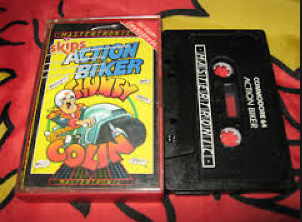There is often talk from those who grew up in 80s UK kids about the good old days of gaming before the large development houses and multimillion pound projects. I was born in 1984 so perhaps I was a little late to the party, but I still join them with fond memories of gaming in the late 80s and early 90s and playing games.

Grabbing a biking game sponsored by skips for £1.99 is a staple of 80s childhood. For anybody born in the mid 90s onwards who doesn’t know, that’s a cassette.
The scene that is often described by them is very interesting. There was a boom in computers entering family’s homes, you could pick up a computer such as the C64 or Spectrum that would plug into a TV for around £120 – £200, which was substantially cheaper than all in one machines such as the Apple II that included a monitor and other . Primary schools in the UK had also recently gone through a phase of bringing in similar computers such as the BBC Micro, giving kids good nagging fodder when hassling their parents for one claiming they could use it for homework. The truth is that most kids didn’t have homework on their mind, they had games.
Popping along to your local Woolworths, WH Smiths, Boots or even newsagents and browsing through the budget game sections is a popular memory that often creeps up on retro gaming websites. Many gamers remember distributors such as Mastertronic who charged all their games at £1.99 or £2.99 (extra pound for something special).
The time is often looked back on fondly by developers too, magazines would come with print outs of code which you could type in to your home system to make them run. If you were clever enough you could write your own games and send them in to the magazine and get paid if they got published. Publishers were also on the prowl for talented games makers and the really good games would get to join the ranks on the shelves of Woolworths. A crash in the computer game market in 1983 saw the collapse of many game development studios allowing hobbyists to get their foot in the door. In this era the some bedroom coders became mini-superstars with names such as Matthew Smith (Manic Miner and Jet Set Willy) and Jeff Minter (Attack of the Mutant Camels) becoming well known. This scene started to die out around the early 90s. The industry recovered from the crash and new development houses and consoles started to dominate over bedroom consoles and home computers. The strict rules and high costs to develop for popular consoles such as the NES left the bedroom coder behind.
The bedroom coder is back
We often look back on the state of things with such fondness that we don’t appreciate the state today. The support for cheap hardware and access to cheap games reminds me very much of my happy 80s days. During the 80s cheap machines of their time were around £200 and while machines hadn’t been that cheap before that time it is apparently the same as spending £600 today (according to measuringworth) more than enough for a budget computer, or if you wanted to get a true budget games machine you could purchase an android gaming device such as the Ouya for £99 (don’t tho).
Magazines no longer print code to help you get started with a project, but there are plenty of code repositories, tutorial sites, forums and online courses to get people started . Woolworths, Boot and WHsmiths no longer sell games from budget publishers but that doesn’t mean that the indie bedroom coder doesn’t have a market place. All the major digital distribution channels allow submissions from indie games, some are even geared towards having indie games only!
Looking back at my game purchases for the year most of them are games by independent game developers much like the purchases I would make as a child with pocket money in the early 90s. I remember buying packs of games where I would pay a little extra to get a few bonus games. This reminds me somewhat of the humble bundles I purchase today, you pay a few quid to get 5-6 really high quality indie games.
Going forward the trend doesn’t seem to be stopping, on the one hand the marketplace for independent developers is getting so swamped its harder to stand out, but those with great ideas and skills to carry them out are getting themselves known and seem to be making a living out of it. I wonder if in twenty years time the kids of today will be looking over it as a time of great creative and opportunities.
0 Comments